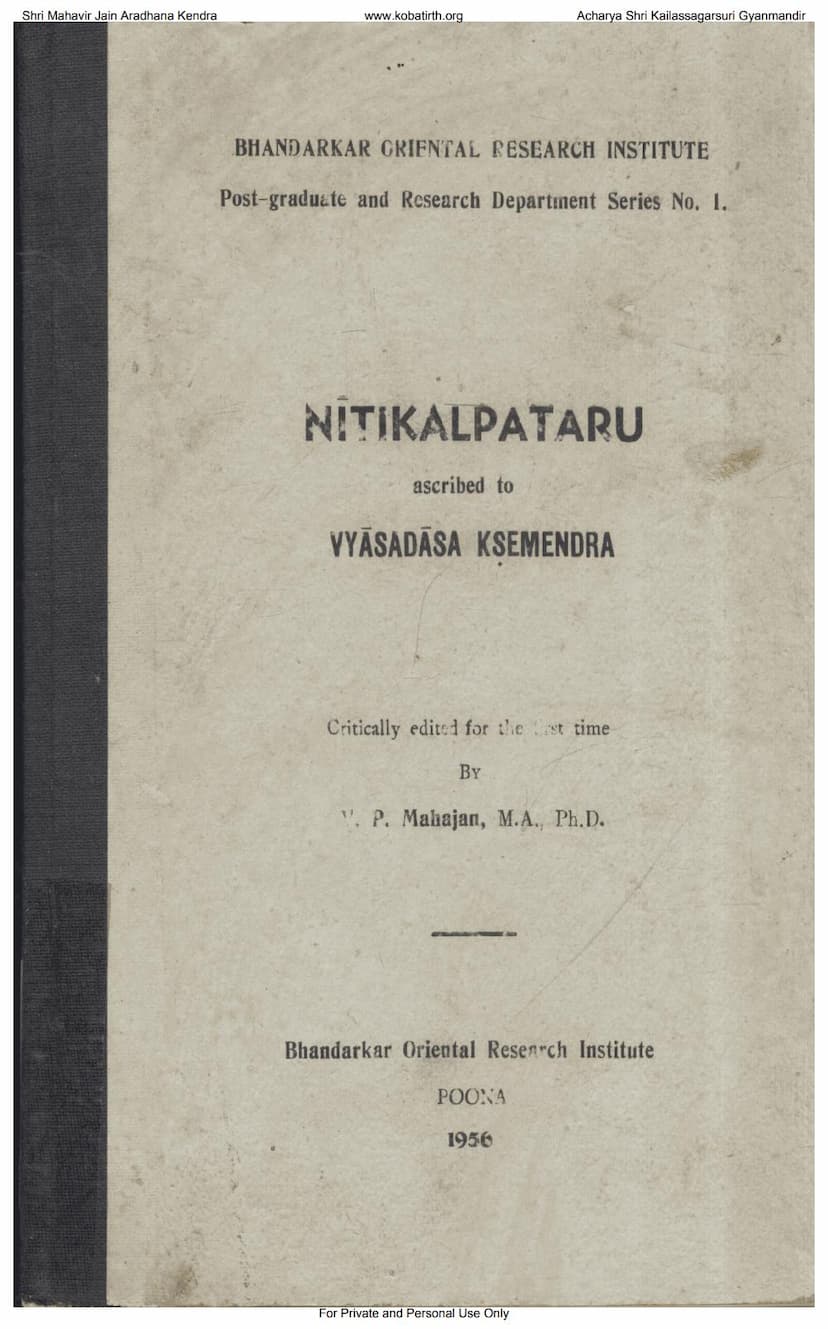Niti Kalptaru
Added to library: September 2, 2025

Summary
Here's a comprehensive summary of the Jain text "Niti Kalptaru" by V. P. Mahajan, based on the provided pages:
Book Title: Niti Kalptaru (नीतिकल्पतरुः) Author: Ascribed to Vyāsadāsa Kṣemendra Critically Edited By: V. P. Mahajan Publisher: Bhandarkar Oriental Research Institute, Poona Publication Year: 1956 Series: Bhandarkar Oriental Research Institute Post-graduate and Research Department Series No. 1.
Overall Nature and Scope:
"Niti Kalptaru" is a treatise on polity, governmental administration, and worldly wisdom. It aims to provide guidance on how to live a virtuous and successful life, emphasizing the importance of niti (policy, ethics, wisdom) in achieving both worldly and spiritual prosperity. The text covers a vast range of topics, from the qualities of a good ruler and his ministers to practical advice on conduct, the identification of virtues and vices, and even the auspicious and inauspicious characteristics of various entities.
Key Themes and Content:
The book is structured into numerous sections or kusumas (chapters/flowers), covering an extensive array of subjects. While the provided text focuses on the initial sections and their introductions, the table of contents (pages 8-12) reveals the breadth of topics discussed. Some of the prominent themes include:
- The Importance of Niti (नीतिमाहात्म्यवर्णनं): The text begins by extolling the supreme importance of niti as the "divine eye" that distinguishes humans from animals, leading to divine status and ultimate well-being.
- The Role of Destiny (Adrishta) vs. Human Effort (Niti): A significant discussion revolves around the interplay between destiny (daiva) and human endeavor (purushartha or niti). While acknowledging the power of destiny, the text strongly advocates for adhering to niti and making consistent effort, illustrating this with stories from the Mahabharata where wise individuals navigate challenging circumstances through their adherence to principles.
- The Nature of Niti (नीतिस्वरूपकथनम्): Niti is defined as pure intellect (amala prajna) that leads to the welfare of oneself and others. It is contrasted with flawed or deceptive knowledge (nitabhas).
- Secrecy of Policy (Niti Gopana): The importance of keeping counsel and policies secret is highlighted, drawing parallels with the secrecy required in strategic decision-making.
- The Necessity of Collective Action (Sametyakarana): The text emphasizes that major tasks are often accomplished through collective effort and collaboration, even in the case of the divine.
- Prudence and Foresight (Samhrama Vichara): The dangers of haste and impulsive actions are contrasted with the benefits of careful consideration and planning, illustrated by the story of the crocodiles.
- Distinguishing the Wise (Vyavaharika Pandita Lakshani): A substantial portion is dedicated to describing the characteristics of a wise person, covering their conduct, speech, understanding, and decision-making processes. This includes distinguishing between different types of wisdom and the qualities that make someone truly learned and effective.
- The Concept of a "Materially Wise" Person (Arthika Pandita): This section likely focuses on individuals who are adept at managing wealth, resources, and practical matters.
- The Nature of Kingship and Governance: The text delves into the qualities required for kings, ministers, priests, advisors, spies, generals, and other officials, outlining their duties and the ideal characteristics they should possess.
- Identification of Fools (Mūrkha Lakshana): A significant portion of the book is dedicated to describing various types of fools and their detrimental behaviors. These descriptions serve as cautionary tales and highlight the negative consequences of ignorance, arrogance, greed, and poor judgment. There are numerous categories of fools described, often based on their specific failings in conduct, understanding, or action.
- Character Analysis: The text includes detailed analyses of personal characteristics, both positive and negative, seen in physical attributes (e.g., features of horses, elephants), behavior, and even the marks on the body.
- Ethical Conduct and Virtues: Throughout the text, there is a strong emphasis on virtues like truthfulness, righteousness, contentment, patience, and compassion, often contrasted with their opposing vices.
- Social and Political Order: The importance of maintaining social harmony, proper relationships, and adherence to duty is consistently stressed.
- The Goal of Life: While covering worldly matters, the ultimate aim of achieving liberation or a state of bliss is implicitly or explicitly present.
Editorial and Publication Details:
- Critical Edition: The publication by the Bhandarkar Oriental Research Institute highlights this as a critical edition, implying a scholarly approach to presenting the text based on available manuscripts.
- Manuscript Reliance: Dr. Mahajan notes that the edition relies on a single manuscript, which led to some conjectural readings.
- Series Importance: This work was chosen as the first volume in the Bhandarkar Oriental Research Institute's Post-graduate and Research Department Series, indicating its academic significance.
Significance:
"Niti Kalptaru" appears to be a comprehensive compendium of practical wisdom and political science relevant to ancient Indian society. Its detailed classifications of virtues, vices, and characteristics of individuals and even animals suggest a holistic approach to understanding and navigating the complexities of life and governance. The attribution to Kṣemendra, a renowned Sanskrit writer, adds to its literary and historical value. The text serves as a valuable resource for understanding ancient Indian thought on ethics, statecraft, and human behavior.